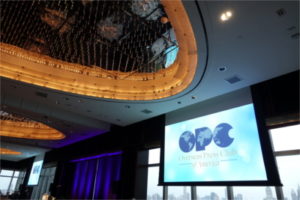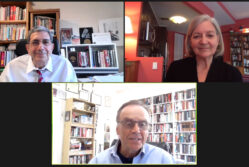Event Coverage Highlight

OPC Awards Celebrate Importance, Impact of Free Press
 By Trish Anderton
By Trish Anderton
In a year marked by attacks on both journalists and journalism itself, foreign correspondents gathered Thursday night to celebrate their work and honor the sacrifices many have made in order to report the news.
“At no time in our country’s history have all of us in this room had a greater collective mission,” keynote speaker Jeff Zucker, president of CNN Worldwide, told a packed room at the OPC Annual Awards Dinner on April 27. “There are more and more places in the world where many news organizations have stopped going because of the inherent dangers. There are repressive governments around the world targeting journalists, and social media platforms allowing violent non-state actors to put out misinformation, putting the onus on us to put more boots on the ground to do credible reporting for our audiences.
“Covering the world has never been more dangerous, more complex, and more important,” Zucker concluded.
With more than 430 entries, this year’s 22 award categories were highly competitive. They reflected a large, diverse and troubled world — from the resource-starved mental hospitals of Venezuela to long-suffering cities and towns of Syria.
Meridith Kohut claimed the Feature Photography Award for her gripping photos of mental patients in Venezuela. As Kohut documented in The New York Times, more than 85 percent of the psychiatric medicines these institutions need are unavailable or extremely difficult to obtain. The patients are ravaged by mental illness and physical deprivation.
“There isn’t enough food and most patients are underweight,” Kohut said. “There’s running water for only a few hours a day, and no funds for any other supplies. There’s no soap, no shampoo, no toothpaste and no toilet paper. All of this in the country with the largest known oil reserves in the world.”
Photographer Daniel Berehulak of The New York Times received the Olivier Rebbot Award for his chilling report on extrajudicial killings in Manila.
“Over the course of 35 days in the Philippines I watched how the anti-drug campaign of the country’s president, Rodrigo Duterte, became an assembly line of state-sanctioned murder,” Berehulak said. “I saw bodies stacked like firewood in a morgue, on sidewalks, near train tracks, and 7-Elevens, and McDonalds, across bedroom mattresses and living room sofas.
“In Duterte’s war you don’t need to be guilty to be marked. Most of the victims I saw were killed by police, assassins and vigilantes with utter impunity.”
Several awards recognized excellence in reporting on Syria and ISIS. Among them was the David Kaplan Award, which went to CNN’s Clarissa Ward for her coverage of the Syrian war.
After six years of “horrific atrocities,” she said, it’s a challenge to keep reporting on the conflict: “We all know what’s happening. The world knows what’s happening. The bloodshed continues, and so we must continue. And it’s really that simple. It’s our duty.”
Some stories had happier endings. The GroundTruth Project and PBS POV shared the Edward R. Murrow Award. Their video focused on an all-girls school in a village north of Kabul. The school offered young women in the area their first chance at an education. That in itself represents progress and hope — but the progress stopped on graduation day, because there was no college for these young women to go to. The filmmakers set out to change that.
“One of the things that I love about working on documentary films is we’re able to build impact campaigns around them,” Beth Murphy of GroundTruth explained. “The impact campaign for this film was to build a college in the same village — a girls’ college. And I’m very happy to say that the college opened just three weeks ago.”
A new prize made its debut this year. The Peter Jennings award honors the best TV program, video or documentary about international affairs one hour or longer. The late anchor’s family has made a long term commitment to supporting the award. His widow, Kaycee Freed Jennings, presented it to HBO’s Real Sports with Bryant Gumbel for “The Lords of the Rings,” which exposed the corruption and exploitation at the heart of the Olympic Games.
“’The Lords of the Rings’ represents what Peter believed in – what he admired, and what, as an anchor with muscles to flex, he supported,” she said; “Smart, gutsy reporting, the kind that takes on the powerful and the powerfully corrupt.”
Many of the award winners pointed out that their work was not theirs alone. They heaped praise on their editors, colleagues, fixers, translators, and sources. Anand Gopal of The Atlantic won the Ed Cunningham Award after spending months with a Sunni family fleeing ISIS jihadists in Iraq.
“Great journalism is not possible without great sources, incredible sources. I was incredibly blessed to meet this family who over the course of a year allowed me into their lives — allowed me to glimpse their most intimate moments. And they did so at great risk to themselves,” said Gopal.
OPC President Deirdre Depke launched the evening by giving the President’s Award to the 108 journalists who have died covering the war in Syria.
“With this award we honor their courage and the sacrifice they made to report on one of the 21st century’s ongoing atrocities,” said Depke.
She then invited Abdülhamit Bilici, former editor in chief of Turkey’s Zaman daily newspaper, to light the Candle of Concern for journalists imprisoned around the world. More than 80 newspeople are behind bars in Turkey alone, following this year’s media crackdown by President Recep Tayyip Erdoğan.
It’s been a troubling year for press freedom in the U.S. as well. President Trump has stubbornly touted falsehoods while attacking the fact-based reporting of respected news organizations. He’s also promised to rewrite the libel laws to make it easier to sue the media. Depke pointed out that Trump was expected to skip the White House Correspondents’ Dinner this year in order to hold a rally in Pennsylvania — the kind of rally where he often whips up the crowd by attacking the mainstream media as “corrupt,” “dishonest” and “fake.”
“Tonight it is our turn to be vocal — not loud, but vocal — to forcefully assert that the robust and free press envisioned by America’s founders will not be shouted down by pandering politician or diminished by tweets in the night,” said Depke to a round of applause.
An emotional highlight of the evening was the tribute to former OPC president Roy Rowan. The legendary foreign correspondent and former OPC president died in September.
Award-winning tenor James Valenti sang a short piece in Rowan’s honor, and Overseas Press Club Foundation President Bill Holstein shared his memories of the man.
“We lost a hero this past year,” said “Roy Rowan did it all and did it in style.”
Holstein went on to recount tales of Rowan’s exploits in China in the late 1940s, at the beginning of his long and storied career.
“He taught me a personal lesson,” said Holstein: “to never give up on the things you believe in; to race right up to the edge of death at full speed.”


